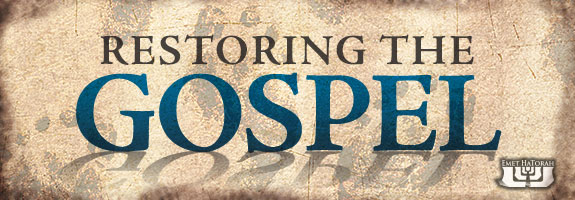Restoring the Gospel - Part 1
Series:

To what can our current understanding of the Good News be compared?
Once there was a man who went to a bicycle shop to purchase a new bike. He walked in the store and saw no bicycles. He did, however, see a shop full of wheels and tires. When the shop owner approached, he asked if he had any bicycles for sale. Smiling, the shop owner replied, “We’re a bike shop! That’s what we have! Just look around you … we have bikes lining the walls and covering the floors! Look them over and see if we have something that you can’t live without.”
Confused, the man replied, “I don’t understand. I’m looking for bicycles. All I see is a shop full of wheels and tires. Where are the frames?”
“Aren’t wheels and tires all you need for a bicycle?” the shop owner responded. “They are what make the bicycle go. They take you from one place to another! You can’t get anywhere with a bicycle that has no tires. Frames are optional. It’s the wheel and tire that do the job. They are the real bicycle. How about we fix you up with a bike?”
Mark Twain is quoted as saying that it is much easier to fool people than to convince them they have been fooled. Have we been duped when it comes to the Gospel? What is the Gospel and why is important that we properly understand it? If we really are incorrect in our understanding of the Gospel how difficult will it be for us to recognize and correct our understanding?
For many the Gospel message — the Good News — can be boiled down to “salvation by grace through faith.” For others, it is “justification through faith.” For still others it is “Jesus’s death, burial and resurrection.” It is at the very heart of Christianity and is the driving force behind all evangelism and outreach efforts. But no matter the semantics, the Good News is generally agreed upon as somehow dealing with personal salvation. But what if personal salvation was only part of the Gospel message? What if the Gospel message was bigger than me and my needs? What if personal salvation was only a component of the Gospel that both Jesus and the Apostles preached? What if our Gospel is only wheels and tires?
Yes, personal salvation is an important, integral part of the Gospel message. But is it the totality of this “Good News” that Jesus and the Apostles preached? And if it is not the whole “package” of the Gospel that Jesus and the Apostles — if it doesn’t include the frame — then we need to reassess our “gospeling.”
Here’s a quote from Scot McKnight with which I think we need to wrestle. He says,
"The gospeling of the apostles in the book of Acts is bold declaration that leads to a summons while much of evangelism today is crafty persuasion."
If we do more than pull isolated quotes from Paul’s epistles, we will find that this is indeed the case. Not only do the Apostles preach a gospel of declaration, but so does Jesus. And these two tiers upon which of our faith is based should inform us and act as our model for Gospel proclamation. But what does it mean to “declare” verses “persuade”? We will attempt to clarify the difference between these two in our next post.
We depend on believers such as yourself to help us spread the message of discipleship and Kingdom living. In order to learn about how we intend on accomplishing this, please read our plan of action on our About page. If you would like to help us empower disciples and restore the Gospel that Jesus and the Apostles preached, please consider contributing financially to support the efforts of Emet HaTorah today.








